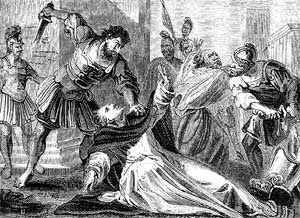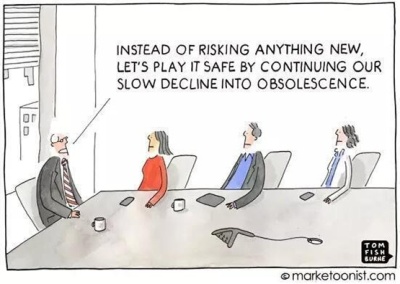 Acts 12 tells us the story of two apostles - James and Peter – who both had run-ins with King Herod. “He killed James the brother of John with the sword, and when he saw that it pleased the Jews, he proceeded to arrest Peter also.” (Acts 12:2-3) Acts 12 goes on to tell how an angel appeared to Peter in prison, removed his chains and led him onto the street. Peter makes his way to the house of Mary, the mother of James and John to tell them the good news. Peter is left on the street for another couple of minutes while the occupants (who had been praying for Peter) argue whether it’s really Peter waiting at the door. Once they let him in, Peter gets to tell everyone about how the Lord saved him.
Acts 12 tells us the story of two apostles - James and Peter – who both had run-ins with King Herod. “He killed James the brother of John with the sword, and when he saw that it pleased the Jews, he proceeded to arrest Peter also.” (Acts 12:2-3) Acts 12 goes on to tell how an angel appeared to Peter in prison, removed his chains and led him onto the street. Peter makes his way to the house of Mary, the mother of James and John to tell them the good news. Peter is left on the street for another couple of minutes while the occupants (who had been praying for Peter) argue whether it’s really Peter waiting at the door. Once they let him in, Peter gets to tell everyone about how the Lord saved him.
The normal question that might be asked is, “Why was Peter saved and not James?” But this is the wrong question. The question that needs to be asked here is, “Who was saved?”...
The answer is that God saved both James and Peter.
God saved Peter by setting him free from prison, thus allowing him to escape execution. God saved James by bringing him to be face-to-face in God’s presence for eternity.
Romans 10 tells us that “everyone who calls on the name of the Lord will be saved”. These words are repeated in many places throughout the scriptures, and have been quoted thousands of times by theologians and preachers. Yet we humans still have a predisposition to think we are saved if we keep living in this life, and we lose our life if we die. This may be true for those who don’t yet know Christ, but for those of us who are followers of Jesus, “to live is Christ, and to die is gain” (Philippians 1:21).
 Sadly, I have listened to many Christians during this COVID situation who seem to think that it is vitally important to totally avoid every possible risk of contracting coronavirus. They seem to forget that there are many risks in life and if we are serious about living for Jesus, we will sometimes need to take risks. Jesus said, “If anyone would come after me, let him deny himself and take up his cross and follow me. For whoever would save his life will lose it, but whoever loses his life for my sake and the gospel's will save it.” (Mark 8:34-35) But considering some of the conversations I have heard over the last year, I have been wondering if many Christians listen more to media and government announcements about COVID rather than listening to the Bible.
Sadly, I have listened to many Christians during this COVID situation who seem to think that it is vitally important to totally avoid every possible risk of contracting coronavirus. They seem to forget that there are many risks in life and if we are serious about living for Jesus, we will sometimes need to take risks. Jesus said, “If anyone would come after me, let him deny himself and take up his cross and follow me. For whoever would save his life will lose it, but whoever loses his life for my sake and the gospel's will save it.” (Mark 8:34-35) But considering some of the conversations I have heard over the last year, I have been wondering if many Christians listen more to media and government announcements about COVID rather than listening to the Bible.
This attitude of “losing your life for Christ’s sake in order to save it” was taken by many missionaries serving the Lord in Africa back in the 19th century. In fact, the life expectancy of European missionaries in Africa back then was so poor (about 18 months on average), many missionaries transported their belongings to Africa in a coffin. They did not take their mortality lightly, but their passion for the Lord and serving him was greater than their fear of death.
We should not take foolish risks for the sake of our own entertainment or pleasure, nor should we ignore methods of preventing spread of contagious diseases. But instead of sitting at home waiting for the world to be fully immunised, we should be ready to be out there, serving those who need Christ’s love and his gospel. Instead of considering our Christian brothers and sisters who end up catching COVID due to their Christian faith and service as foolish, should we perhaps consider this as a badge of honor?
Martin Luther, the German reformer said: “I shall ask God mercifully to protect us. Then I shall fumigate, help purify the air, administer medicine and take it. I shall avoid places and persons where my presence is not needed in order not to become contaminated and thus perchance inflict and pollute others and so cause their death as a result of my negligence. If God should wish to take me, he will surely find me and I have done what he has expected of me and so I am not responsible for either my own death or the death of others. If my neighbour needs me, however, I shall not avoid place or person but will go freely, as stated above. See, this is such a God-fearing faith because it is neither brash nor foolhardy and does not tempt God.”
May we all, like Luther, be willing to freely go to our neighbour who needs us (being neither brash nor foolhardy), while trusting our God as the one who saves.


